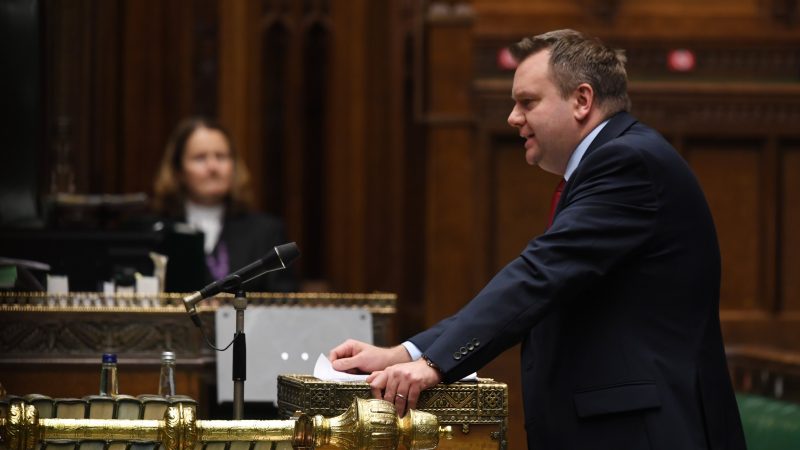
Nick Thomas-Symonds has argued that the police mishandling of the Sarah Everard vigil on Saturday should serve as a “red warning light” that the government should not be “rushing through laws cracking down on protest”.
The Shadow Home Secretary responded to a statement in parliament from Home Secretary Priti Patel this afternoon following the arrests of members of the public at a vigil for Everard, after she disappeared earlier this month.
“The reaction to Sarah Everard’s death across the country has been extraordinarily powerful and moving,” the Labour frontbencher said today. “Led by the passionate voices of women and girls who are rightly demanding action and change.
“And it cannot be right that so many woman continue to fear for their safety on a daily basis, whether on the streets or at home.
“The testimonies that have been shared highlight the unacceptable levels of abuse and misogyny, harassment on the streets, walking home with headphones turned off to listen for threats, keys between fingers, being told to stay home to avoid attackers.
“But let me be clear, it is not women who should change their behaviour. It is men and wider society that need to change. And at times like this, it is vital that people are able to have their voices heard.”
Thomas-Symonds said “things clearly went very wrong” at the event on Saturday, adding that ministers are failing to tackle violence against women and girls and now trying to “curtail their right to protest about it”.
“It is a chronic failure from this government and meetings and reopening surveys alone are nowhere near enough,” he said. “And meetings, we understand, that the women and equalities minister won’t even be attending this evening.”
Patel had informed MPs that a Home Office survey on abuse and harassment, reopened on Friday, has received 78,000 responses. The consultation received 18,000 responses in the ten-week period for which it was initially open.
Thomas-Symonds pointed out that, according to the Office for National Statistics, recorded rapes doubled between 2014 and 2019. The England and Wales crime survey showed over two million people a year experience domestic abuse.
“Yet only a tiny fraction are charged and charging rates are falling. The justice system sends a perverse message that murdering someone at home, which predominately means men killing women, is a lesser crime than killing someone in the street by sending out shorter sentences for domestic homicides.”
He stressed that the bill did not contain the word ‘woman’ but mentioned “memorials” eight times. “They want to lock up people who damage the statues of slave traders for ten years when rape sentences start at half that,” he said.
“Unless there’s action on homicide, unless there’s action on street harassment, unless there’s action on stalking, this bill will risk becoming an abusers’ charter that just allows violence and injustice in our streets and in our homes to continue.”
He highlighted that figures show that 99% of rapes reported to the police in England and Wales result in no legal proceedings and argued that this effectively amounted to a “get out of jail free card” for those committing offences.
“It doesn’t have to be this way,” the Shadow Home Secretary explained to parliament this afternoon. “This could be a time of national unity, when we decide to come together as a country to put forward protections.
“The government can either change course, take necessary action, or ministers will find themselves on the wrong side of history once again.”
The Home Secretary had used her statement this afternoon to tell parliament that she has ordered a ‘lessons learned’ review be carried out following the reports of police misconduct on Saturday evening at Clapham Common.
The bill being debated later today would end halfway release for people convicted of sexual offences, extend the scope of the Sexual Offences Act 2003 and encourage police to impose pre-charge bail in cases such as domestic abuse.
But more than 150 human rights groups, charities and unions have warned that the legislation would be “an attack on some of the most fundamental rights of citizens” by handing police tougher powers to crack down on protesters.
Keir Starmer argued that the bill contains “next to nothing” on countering violence against women and girls while it had “lots of stuff on statues” on Sunday, and described it as a missed opportunity for the government.
Patel today urged people not to attend protests. “The right to protest is the cornerstone of our democracy, but the government’s duty remains to prevent more lives being lost during this pandemic,” the Home Secretary claimed.
She accused Labour of planning to vote “against measures to support victims of violent crimes including young women and girls”. Sources had indicated the party would abstain, but Labour revealed on Sunday that it would oppose the bill.




More from LabourList
SPONSORED: ‘Industrial hemp and the challenge of turning Labour’s priorities into practice’
‘A day is a long time in politics, so we need ‘action this day’’
Strong support for child social media ban among Labour members, poll reveals